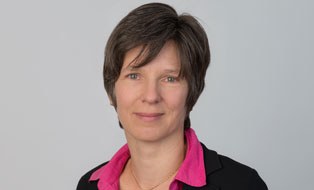Technology of productive Biofilms
Biofilms are microbial communities growing attached at the interphase of aqueous systems. They are well known for causing problems in the medical and technical area due to their persistence against antibiotics or other bactericides leading to severe infections or efficiency losses. Our aim is the utilization of such naturally immobilized microbes as biocatalysts in continuous flow-through reactor systems, by turning their “problematic” characteristics into a benefit for catalysis.

Concept of a tubular biofilm reactor. The biofilm is growing inside the tubing, aqueous medium flows constantly through the biofilm tube, transporting substrates and products in and out of the biofilm.
In principle all chemical product classes can be accessed by biofilm catalysts. However, their absolute advantage becomes obvious when toxic substances like organic solvents are part of the reaction. Due to their intrinsic robustness biofilm catalysts can stand high concentrations of the respective compounds. In addition biofilms represent a living, permanently regenerating biological system and are therefore able to continuously replenish their enzyme pool. Thereby they embody a catalytic system with an infinite turnover number.

Analysis of a cyanobacterial biofilm growing in a glass capillary under segmented flow conditions using confocal laser scanning microscopy (CLSM). The photopigments of the bacteria emit red fluorescence when excited with 633 nm. CLSM is a standard method to analyze biofilms.
To be able to utilize these fascinating microbial communities for biocatalysis it is essential to follow an interdisciplinary approach combining engineering and natural sciences. It is equally important to address biological questions like biofilm growth behavior, structure and physiology, as well as technical questions like reactor configuration, mass transfer issues and scale up. Therefore the group is a team of biologists, biochemists and engineers, working on various questions related to the applicability of bacterial biofilms for biocatalysis. Due to the joint professorship between TU Dresden and the Helmholtz center for Environmental Research (UFZ) in Leipzig, the group is located on the Science Campus of the UFZ in Leipzig.
For more information please visit Technology of productive Biofilms
Prof. Dr. rer. nat. Katja Bühler
